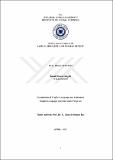Please use this identifier to cite or link to this item:
http://hdl.handle.net/11547/1606Full metadata record
| DC Field | Value | Language |
|---|---|---|
| dc.contributor.author | Gölgeli, İsmail Murat | - |
| dc.date.accessioned | 2019-04-29T08:13:41Z | - |
| dc.date.available | 2019-04-29T08:13:41Z | - |
| dc.date.issued | 2017-04 | - |
| dc.identifier.uri | http://hdl.handle.net/11547/1606 | - |
| dc.description.abstract | Bu çalışmanın amacı Samuel Beckett’in Godot’u Beklerken, Oyunsonu ve Ferhan Şensoy’un Güle Güle Godot oyunlarında uzam, güç ve panoptisizm kavramlarını incelemek ve bu kavramların karakterler üzerindeki etkilerini analiz etmektir. Michel Foucault’nun uzam, güç ve panoptisizm kuramları çalışmanın felsefi temelini oluşturmaktadır. Bu çalışmada beş bölüm bulunmaktadır. Birinci bölümde araştırma sorularına, ikinci bölümde Michel Foucault ve kuramlarına yer verilmiştir. Üçüncü bölümde Absürd Tiyatro, Samuel Beckett, Geleneksel Türk Tiyatrosu ve Ferhan Şensoy detaylandırılmış ve bu araştırma için incelenecek oyunların konuları ele alınmıştır. Dördüncü bölümde araştırma soruları ışığında uzam kavramı ve Foucault’nun heterotopya kuramının altı ilkesi oyunlarda ayrıntılı olarak incelenmiştir. Güç kuramı oyunlarda aranmış, karakterlerin güç olgusundan nasıl etkilendikleri analiz edilmiş ve tartışılmıştır. Panoptisizmin etkileri araştırılmış ve karakterlerin panoptisizm karşısında ki davranış, tutum ve düşünceleri incelenmiştir. Son bölümde araştırma soruları sentezlenmiş ve cevaplar bulunmaya çalışılmıştır. Bulunan bu cevaplar oyunların geçtiği ülkelerin toplumlarına ışık tutmaktadır. Bulgular Şensoy’un karakterlerinin Beckett’in karakterlerine göre geleceğe daha umutla baktığını ortaya koymaktadır. Beckett’in karakterleri ya sınırlandırılmış eylemler içerisinde ya da tamamen hapis olmuş durumdadırlar. Şensoy’un karakterleri psikolojik ve fiziksel zararlardan kolayca kurtulabilmekte ve kendi otoritelerini kurmaya başlamaktadırlar. Güle Güle Godot’da karakterler arasındaki ilişkiler Beckett’in karakterlerine göre daha yakın ve samimidir. Beckett’in oyunlarında karakterler arasında dönüşümlü güç ilişkisi bulunmaktadır ve bu ilişki karşılıklı ihtiyaçlardan doğmaktadır. Öte yandan Güle Güle Godot’ daki karakterlerin birbirleriyle olan ilişkileri daha saf ve gerçek arkadaşlık içermektedir. Her üç oyunda bütün karakterler bekleme eylemi içerisindedirler, fakat bu beklemeler farklı biçimlerde ve farklı sebeplerden dolayı gerçekleşmektedir. Hepsi içinde bulundukları koşulları değiştirmek istemektedirler. Bu karakterler kendileri ve özellikle içinde bulundukları dünya hakkındaki sorulara yanıt bulmak arzusu taşımaktadırlar. Beckett’in karakterleri için bu sorular yanıtsız kalmakta; Şensoy’un karakterleri için birincil önemdeki soru yanıt bulmaktadır. | tr_TR |
| dc.language.iso | en | tr_TR |
| dc.publisher | ISTANBUL AYDIN UNIVERSITY INSTITUTE OF SOCIAL SCIENCES | tr_TR |
| dc.subject | Michel Foucault | tr_TR |
| dc.subject | Uzam | tr_TR |
| dc.subject | Güç | tr_TR |
| dc.subject | Panoptisizm | tr_TR |
| dc.subject | Samuel Beckett | tr_TR |
| dc.subject | Ferhan Şensoy | tr_TR |
| dc.subject | Michel Foucault | tr_TR |
| dc.subject | Space | tr_TR |
| dc.subject | Power | tr_TR |
| dc.subject | Panopticism | tr_TR |
| dc.subject | Samuel Beckett | tr_TR |
| dc.subject | Ferhan Şensoy | tr_TR |
| dc.title | SPACE AND POWER IN SAMUEL BECKETT AND FERHAN ŞENSOY | tr_TR |
| dc.type | Thesis | tr_TR |
| dc.description.abstractol | The aim of this study is to analyze the concept of space and investigate the theory of power, the effects of power and panopticism over the characters in the plays of Samuel Beckett’s Waiting for Godot and Endgame, and Ferhan Şensoy’s Güle Güle Godot (Good Riddance Godot). Theories on space, power and panopticism of Michel Foucault form philosophical background of the study. The study is comprised of five chapters. The first chapter introduces the research questions and the second discusses Michel Foucault and his philosophy. The third elaborates the Theatre of the Absurd, Samuel Beckett, Turkish Traditional Theatre and Ferhan Şensoy and outlines the plots and the background of the plays in question. The fourth chapter addresses the research questions and carries the discussion forward into analysis of the plays. Detailed analysis and the discussion of the concept of space is presented for all three plays. The six principles of heterotopias of Foucault are examined in the plays in detail. Power in the plays is scrutinized and how the characters are affected by power is analyzed and discussed. The effect of panopticism is studied and the manners of the characters against panopticism is investigated. The final chapter of the study synthesizes the answers to the research questions. The answers that are found in the plays shed light to the societies that the plays belong to. The findings demonstrate that Şensoy’s characters are more hopeful for their future than Beckett’s. Beckett’s characters are either in restrained action or in total confinement. Şensoy’s characters even after psychological and physical destruction recover quickly and try to establish their own authority. Personal ties among the characters are stronger in Good Riddance Godot than they are in Beckett’s plays. In Beckett’s plays, there is an interchangeable power relationship between the characters, and this power relation is based on mutual need. On the other hand, there is a pure and sincere friendship among people in Good Riddance Godot. All the characters in the three plays studied are waiting but in different manners and with different expectations. They all want to change their circumstances and try to find answers to the questions mostly about themselves and the world around them. In Beckett, the questions remain unanswered, but in Şensoy, the main problem is at least answered. | tr_TR |
| dc.publisher.firstpagenumber | 1 | tr_TR |
| dc.publisher.lastpagenumber | 257 | tr_TR |
| Appears in Collections: | Tezler -- Thesis | |
Files in This Item:
| File | Description | Size | Format | |
|---|---|---|---|---|
| SPACE AND POWER IN.pdf | Tez Dosyası | 2.07 MB | Adobe PDF |  View/Open |
Items in DSpace are protected by copyright, with all rights reserved, unless otherwise indicated.
